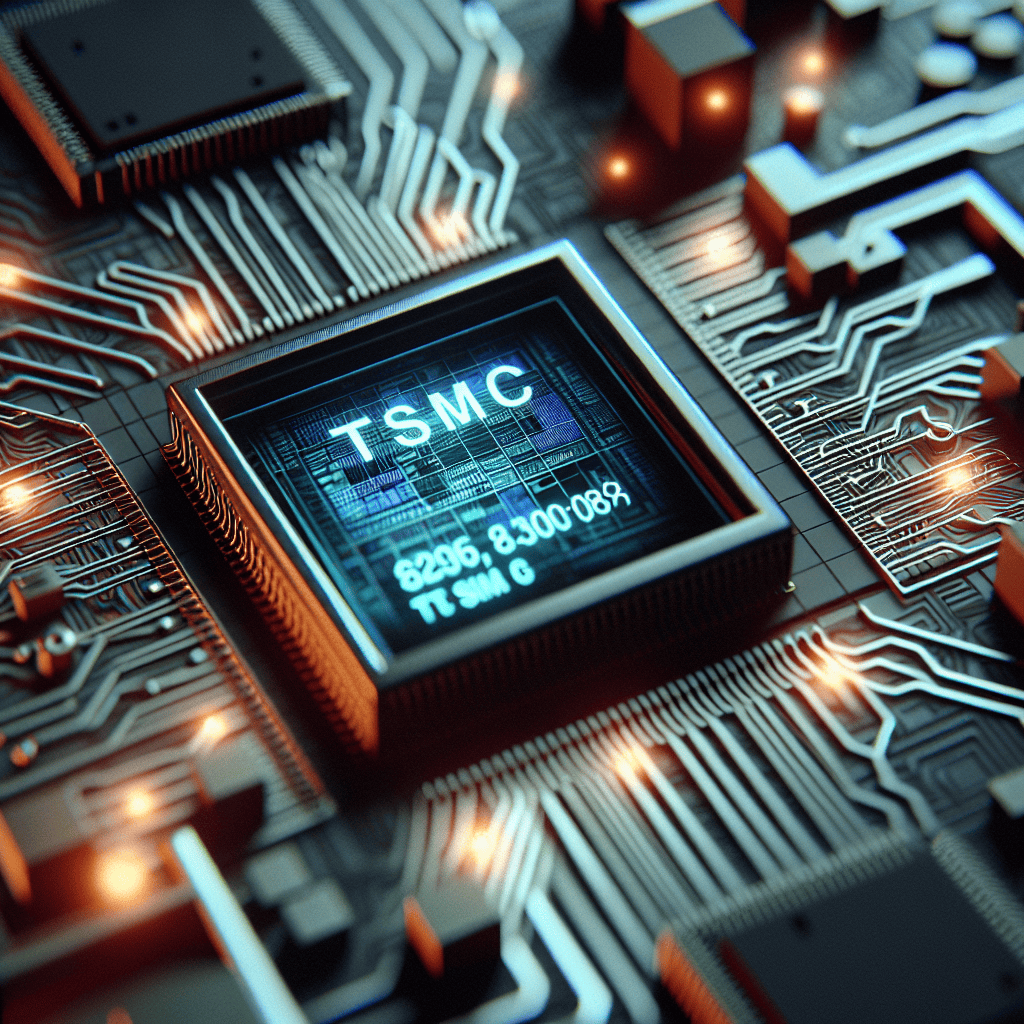“TSMC Earnings: Navigating the Chip Slowdown with Precision and Resilience”
Introduction
Taiwan Semiconductor Manufacturing Company (TSMC), the world’s largest contract chipmaker, is set to release its earnings amid growing concerns over a slowdown in the global semiconductor industry. As a pivotal player in the tech supply chain, TSMC’s financial performance is closely watched by investors and analysts alike, providing critical insights into the health of the chip sector. The company has been navigating a complex landscape marked by fluctuating demand, geopolitical tensions, and supply chain disruptions. With the semiconductor industry facing potential headwinds, TSMC’s earnings report will be scrutinized for indications of future growth prospects, strategic investments, and its ability to maintain leadership in advanced chip manufacturing.
TSMC’s Strategic Response to Chip Industry Slowdown
Taiwan Semiconductor Manufacturing Company (TSMC), a pivotal player in the global semiconductor industry, finds itself under the microscope as concerns about a potential slowdown in the chip industry loom large. As the world’s largest contract chipmaker, TSMC’s earnings reports are closely watched by investors and industry analysts alike, serving as a barometer for the health of the semiconductor sector. In recent years, the company has demonstrated remarkable resilience and adaptability, navigating through various challenges, including geopolitical tensions and supply chain disruptions. However, the current environment presents a unique set of challenges that require strategic foresight and agile responses.
The semiconductor industry, which has experienced a period of unprecedented growth driven by the proliferation of digital technologies, now faces headwinds that threaten to temper its momentum. Factors such as fluctuating demand, inventory adjustments, and macroeconomic uncertainties have contributed to a more cautious outlook. In this context, TSMC’s strategic response is crucial not only for its own financial performance but also for the broader industry landscape. The company’s approach to these challenges is multifaceted, encompassing technological innovation, capacity management, and customer engagement.
One of TSMC’s key strategies in addressing the potential slowdown is its continued investment in research and development. By pushing the boundaries of semiconductor technology, TSMC aims to maintain its competitive edge and meet the evolving needs of its clients. The company’s focus on advanced process nodes, such as 3nm and beyond, underscores its commitment to innovation. These cutting-edge technologies are expected to drive demand in high-performance computing, artificial intelligence, and other emerging applications, thereby offsetting potential declines in more mature segments.
In addition to technological advancements, TSMC is also optimizing its production capacity to align with market conditions. The company has been judiciously managing its capital expenditures, ensuring that its capacity expansion plans are in sync with anticipated demand. This approach not only helps mitigate the risks associated with overcapacity but also positions TSMC to capitalize on opportunities as they arise. By maintaining a flexible and responsive production strategy, TSMC can better navigate the cyclical nature of the semiconductor industry.
Furthermore, TSMC’s strong relationships with its diverse customer base play a pivotal role in its strategic response to industry challenges. The company collaborates closely with leading technology firms across various sectors, including consumer electronics, automotive, and telecommunications. By understanding their specific needs and aligning its offerings accordingly, TSMC enhances its value proposition and strengthens customer loyalty. This customer-centric approach not only ensures a steady stream of business but also fosters long-term partnerships that are resilient to market fluctuations.
As TSMC prepares to release its latest earnings report, stakeholders will be keenly observing how these strategic initiatives translate into financial performance. While the broader industry may face uncertainties, TSMC’s proactive measures provide a degree of confidence in its ability to weather the storm. The company’s emphasis on innovation, capacity management, and customer engagement positions it well to navigate the challenges ahead. Ultimately, TSMC’s strategic response to the potential chip industry slowdown serves as a testament to its leadership and adaptability in an ever-evolving landscape. As the semiconductor industry continues to play a critical role in shaping the future of technology, TSMC’s actions will undoubtedly have far-reaching implications for the sector as a whole.
Analyzing TSMC’s Earnings Amid Global Semiconductor Challenges
Taiwan Semiconductor Manufacturing Company (TSMC), a pivotal player in the global semiconductor industry, has recently captured the attention of investors and analysts alike as it prepares to release its latest earnings report. This comes at a time when the semiconductor sector is grappling with a myriad of challenges, including fluctuating demand, supply chain disruptions, and geopolitical tensions. As the world’s largest contract chipmaker, TSMC’s performance is often seen as a bellwether for the broader industry, making its earnings report a critical point of analysis for stakeholders seeking to understand the current state and future trajectory of the semiconductor market.
In recent years, TSMC has experienced robust growth, driven by its advanced manufacturing capabilities and strategic partnerships with leading technology companies. The company’s ability to produce cutting-edge chips has positioned it as a key supplier for high-demand sectors such as consumer electronics, automotive, and telecommunications. However, the semiconductor industry is currently facing a slowdown, attributed to a combination of factors including the cyclical nature of the market, economic uncertainties, and a post-pandemic adjustment in consumer behavior. Consequently, TSMC’s upcoming earnings report is expected to provide valuable insights into how the company is navigating these challenges and what strategies it is employing to maintain its competitive edge.
One of the primary concerns for TSMC and the semiconductor industry at large is the ongoing supply chain disruptions. The COVID-19 pandemic exposed vulnerabilities in global supply chains, leading to shortages of critical components and delays in production. While TSMC has made significant investments in expanding its manufacturing capacity, the company is not immune to these disruptions. Analysts will be closely examining TSMC’s earnings report for indications of how supply chain issues have impacted its production capabilities and whether the company has been able to mitigate these challenges through strategic sourcing and inventory management.
Moreover, geopolitical tensions, particularly between the United States and China, have added another layer of complexity to the semiconductor landscape. TSMC, which operates at the intersection of these two economic powerhouses, must navigate a delicate balance to maintain its market position. The company’s earnings report may shed light on how it is addressing potential risks associated with export controls, trade restrictions, and the push for semiconductor self-sufficiency in various regions. Investors will be keen to understand how TSMC is positioning itself in this evolving geopolitical environment and what measures it is taking to safeguard its operations and market access.
In addition to external challenges, TSMC’s earnings report will also be scrutinized for its innovation and technological advancements. The semiconductor industry is characterized by rapid technological evolution, and TSMC’s ability to stay at the forefront of innovation is crucial for its long-term success. The company’s progress in developing next-generation chip technologies, such as 3-nanometer and 2-nanometer processes, will be of particular interest to analysts assessing TSMC’s future growth prospects. Furthermore, TSMC’s efforts to diversify its customer base and expand into emerging markets will be evaluated as part of its strategy to sustain growth amid a potential industry slowdown.
In conclusion, TSMC’s earnings report is poised to offer a comprehensive view of the company’s performance and strategic direction in the face of global semiconductor challenges. As the industry navigates a period of uncertainty, TSMC’s ability to adapt and innovate will be critical in determining its continued leadership in the semiconductor market. Investors and analysts will be closely monitoring the company’s financial results and strategic initiatives to gauge its resilience and potential for future growth.
TSMC’s Market Position in a Slowing Chip Industry
Taiwan Semiconductor Manufacturing Company (TSMC), a pivotal player in the global semiconductor industry, finds itself under the microscope as concerns about a slowdown in the chip industry intensify. As the world’s largest contract chipmaker, TSMC’s earnings reports are closely watched by investors and industry analysts alike, serving as a barometer for the health of the broader semiconductor market. In recent years, TSMC has enjoyed robust growth, driven by the insatiable demand for chips used in everything from smartphones to automobiles. However, the current economic climate, marked by geopolitical tensions and fluctuating consumer demand, has cast a shadow over the industry’s future prospects.
The semiconductor industry, which has historically been characterized by cyclical fluctuations, is now facing a unique set of challenges. The COVID-19 pandemic initially led to a surge in demand for electronic devices, as remote work and digital transformation initiatives accelerated. However, as the world gradually returns to normalcy, this demand has begun to stabilize, leading to concerns about overcapacity and inventory build-up. Furthermore, the ongoing trade tensions between the United States and China have added an additional layer of complexity, as companies navigate export restrictions and supply chain disruptions.
In this context, TSMC’s market position remains strong, yet it is not immune to these broader industry dynamics. The company’s strategic focus on advanced process technologies, such as its 5-nanometer and 3-nanometer nodes, has allowed it to maintain a competitive edge. These cutting-edge technologies are crucial for producing high-performance chips that power the latest generation of consumer electronics and data centers. As a result, TSMC continues to attract major clients, including tech giants like Apple and NVIDIA, who rely on its expertise to manufacture their most advanced products.
Despite these strengths, TSMC must navigate the challenges posed by the current economic environment. The potential for a slowdown in consumer electronics demand, coupled with the uncertainties surrounding global trade policies, could impact the company’s growth trajectory. To mitigate these risks, TSMC has been diversifying its customer base and expanding its manufacturing footprint beyond Taiwan. The company’s recent investments in new facilities in the United States and Japan are indicative of its commitment to maintaining a resilient and flexible supply chain.
Moreover, TSMC’s focus on sustainability and innovation positions it well to capitalize on emerging opportunities in the semiconductor industry. The growing emphasis on energy-efficient technologies and the transition to electric vehicles present new avenues for growth. TSMC’s expertise in producing chips for automotive applications, including those used in autonomous driving systems, aligns with these trends and underscores its ability to adapt to changing market demands.
In conclusion, while concerns about a slowdown in the chip industry persist, TSMC’s strategic initiatives and market leadership provide a solid foundation for navigating these challenges. The company’s continued investment in advanced technologies and its proactive approach to supply chain management are likely to sustain its competitive advantage. As the semiconductor landscape evolves, TSMC’s ability to innovate and adapt will be crucial in maintaining its position as a leader in the industry. Investors and industry stakeholders will undoubtedly keep a close eye on TSMC’s earnings reports, as they offer valuable insights into the company’s performance and the broader health of the semiconductor market.
Impact of Global Economic Trends on TSMC’s Financial Performance

Taiwan Semiconductor Manufacturing Company (TSMC), a pivotal player in the global semiconductor industry, finds its financial performance under scrutiny as concerns about a potential slowdown in the chip industry loom large. The company’s earnings are closely watched by investors and analysts alike, as they serve as a barometer for the broader semiconductor market. In recent years, TSMC has enjoyed robust growth, driven by the insatiable demand for chips across various sectors, including consumer electronics, automotive, and telecommunications. However, the current global economic landscape presents a complex set of challenges that could impact TSMC’s financial trajectory.
To begin with, the semiconductor industry is inherently cyclical, and TSMC is not immune to these fluctuations. The recent surge in demand, fueled by the pandemic-induced digital transformation, has led to unprecedented growth. Yet, as the world gradually emerges from the pandemic, there is a palpable concern that this demand may taper off. Moreover, the global economy is grappling with inflationary pressures, supply chain disruptions, and geopolitical tensions, all of which could potentially dampen consumer spending and, by extension, the demand for semiconductors.
In addition to these macroeconomic factors, TSMC must navigate the intricacies of the semiconductor supply chain. The company has been investing heavily in expanding its production capacity to meet the burgeoning demand. However, supply chain bottlenecks, particularly in the procurement of raw materials and equipment, pose a significant challenge. These disruptions could lead to increased production costs and delays, thereby affecting TSMC’s profitability. Furthermore, the semiconductor industry is characterized by rapid technological advancements, necessitating continuous investment in research and development. TSMC’s ability to innovate and maintain its technological edge will be crucial in sustaining its competitive advantage and financial performance.
Another critical aspect to consider is the geopolitical landscape, which has a profound impact on TSMC’s operations. The ongoing trade tensions between the United States and China have led to a realignment of the global semiconductor supply chain. As a key supplier to major technology companies, TSMC finds itself at the center of this geopolitical tug-of-war. The imposition of export controls and tariffs could potentially disrupt TSMC’s business operations and affect its revenue streams. Additionally, the push for semiconductor self-sufficiency by various countries could lead to increased competition and market fragmentation, posing further challenges to TSMC’s growth prospects.
Despite these challenges, TSMC remains well-positioned to capitalize on emerging opportunities. The proliferation of 5G technology, the rise of artificial intelligence, and the growing demand for electric vehicles are expected to drive long-term growth in the semiconductor industry. TSMC’s strategic investments in advanced manufacturing technologies, such as 3nm and 2nm process nodes, position it to capture a significant share of these burgeoning markets. Moreover, the company’s strong customer relationships and reputation for quality and reliability provide a solid foundation for sustained financial performance.
In conclusion, while TSMC faces a myriad of challenges amid concerns of a chip industry slowdown, its strategic initiatives and market positioning offer a degree of resilience. The interplay of global economic trends, supply chain dynamics, and geopolitical factors will undoubtedly shape TSMC’s financial performance in the coming quarters. As such, stakeholders will be keenly observing how the company navigates these complexities to maintain its leadership in the semiconductor industry.
TSMC’s Innovation and Investment Strategies During Industry Uncertainty
Taiwan Semiconductor Manufacturing Company (TSMC), a pivotal player in the global semiconductor industry, finds itself under the microscope as concerns about a potential slowdown in the chip industry loom large. As the world’s largest contract chipmaker, TSMC’s earnings reports are closely watched by investors and industry analysts alike, serving as a barometer for the health of the semiconductor sector. Amidst these concerns, TSMC’s innovation and investment strategies are crucial in navigating the uncertain landscape and maintaining its competitive edge.
In recent years, the semiconductor industry has experienced unprecedented growth, driven by the proliferation of digital technologies, the rise of artificial intelligence, and the increasing demand for consumer electronics. However, as the industry matures, signs of a potential slowdown have emerged, prompting companies like TSMC to reassess their strategies. Despite these challenges, TSMC remains committed to innovation, investing heavily in research and development to push the boundaries of chip technology. This commitment is evident in their ongoing efforts to advance process technologies, such as the development of 3-nanometer and 2-nanometer nodes, which promise to deliver significant improvements in performance and energy efficiency.
Moreover, TSMC’s strategic investments extend beyond technological advancements. The company is also focused on expanding its global footprint to mitigate risks associated with geopolitical tensions and supply chain disruptions. For instance, TSMC has announced plans to build new manufacturing facilities in the United States and Japan, a move that not only diversifies its production capabilities but also aligns with the growing trend of regionalization in the semiconductor industry. By establishing a presence in key markets, TSMC aims to enhance its resilience and better serve its global customer base.
In addition to geographical expansion, TSMC is also exploring new business opportunities to sustain growth amid industry uncertainty. The company is increasingly targeting emerging sectors such as automotive electronics and the Internet of Things (IoT), which are expected to drive future demand for semiconductors. By leveraging its expertise in advanced chip technologies, TSMC is well-positioned to capitalize on these opportunities and capture a larger share of these burgeoning markets.
Furthermore, TSMC’s focus on sustainability and environmental responsibility is another critical aspect of its strategy. As the semiconductor industry faces mounting pressure to reduce its environmental impact, TSMC is taking proactive steps to minimize its carbon footprint and promote sustainable practices. The company has set ambitious targets for reducing greenhouse gas emissions and increasing the use of renewable energy in its operations, demonstrating its commitment to environmental stewardship.
While the semiconductor industry faces potential headwinds, TSMC’s robust innovation and investment strategies provide a solid foundation for navigating these challenges. By continuing to push the envelope in chip technology, expanding its global presence, exploring new market opportunities, and prioritizing sustainability, TSMC is well-equipped to weather the uncertainties and maintain its leadership position in the industry. As investors and analysts closely monitor TSMC’s earnings, the company’s strategic initiatives will undoubtedly play a crucial role in shaping its future trajectory and the broader semiconductor landscape. In conclusion, TSMC’s proactive approach to innovation and investment serves as a testament to its resilience and adaptability in an ever-evolving industry.
Comparing TSMC’s Earnings with Competitors in the Chip Sector
In recent years, the semiconductor industry has experienced a remarkable surge in demand, driven by advancements in technology and the proliferation of electronic devices. However, as concerns about a potential slowdown in the chip industry loom, investors and analysts are keenly observing the earnings reports of major players in the sector. Among these, Taiwan Semiconductor Manufacturing Company (TSMC) stands out as a bellwether, given its pivotal role in the global supply chain. Comparing TSMC’s earnings with those of its competitors provides valuable insights into the current state of the industry and the challenges it faces.
TSMC, the world’s largest contract chipmaker, has consistently demonstrated robust financial performance, largely due to its advanced manufacturing capabilities and strategic partnerships with leading technology firms. In its latest earnings report, TSMC reported a significant increase in revenue, driven by strong demand for its cutting-edge 5-nanometer and 7-nanometer process technologies. This growth underscores TSMC’s ability to capitalize on the ongoing demand for high-performance computing and 5G applications, even as the broader industry grapples with supply chain disruptions and geopolitical tensions.
In contrast, some of TSMC’s competitors have faced more pronounced challenges. For instance, Intel, a major player in the semiconductor space, has encountered delays in its transition to more advanced process nodes, which has impacted its market share and financial performance. While Intel has made strides in addressing these issues, its earnings have not kept pace with those of TSMC, highlighting the competitive advantage that TSMC’s technological leadership provides.
Similarly, Samsung Electronics, another key competitor, has faced its own set of hurdles. Although Samsung has made significant investments in its semiconductor division, it has struggled to match TSMC’s prowess in the foundry business. Samsung’s earnings have been affected by fluctuations in memory chip prices and the cyclical nature of the semiconductor market. Despite these challenges, Samsung remains a formidable competitor, with a diverse product portfolio that includes memory chips, displays, and consumer electronics.
As the industry navigates a potential slowdown, the ability to innovate and adapt to changing market dynamics becomes increasingly crucial. TSMC’s focus on research and development, coupled with its strategic partnerships, positions it well to weather any downturns. The company’s commitment to expanding its manufacturing capacity, particularly in the United States and Japan, further underscores its long-term growth strategy.
Moreover, TSMC’s emphasis on sustainability and environmental responsibility resonates with stakeholders who prioritize corporate social responsibility. By investing in green technologies and reducing its carbon footprint, TSMC not only enhances its brand reputation but also aligns itself with global efforts to combat climate change.
In conclusion, while concerns about a slowdown in the chip industry persist, TSMC’s earnings performance relative to its competitors highlights its resilience and strategic foresight. The company’s ability to maintain its technological edge and adapt to evolving market conditions will be critical in sustaining its leadership position. As the semiconductor landscape continues to evolve, TSMC’s role as an industry leader will undoubtedly remain in focus, offering valuable lessons for its competitors and the broader market.
Future Outlook for TSMC in a Volatile Semiconductor Market
Taiwan Semiconductor Manufacturing Company (TSMC), a pivotal player in the global semiconductor industry, finds itself under the microscope as concerns about a potential slowdown in the chip market loom large. As the world’s largest contract chipmaker, TSMC’s earnings reports are closely watched by investors and industry analysts alike, serving as a barometer for the health of the semiconductor sector. In recent years, the company has enjoyed robust growth, driven by the insatiable demand for chips across various sectors, including consumer electronics, automotive, and data centers. However, as the industry faces headwinds, the future outlook for TSMC is becoming increasingly complex.
To begin with, the semiconductor industry is inherently cyclical, characterized by periods of rapid growth followed by slowdowns. Currently, there are signs that the industry may be entering a phase of deceleration. Factors such as geopolitical tensions, supply chain disruptions, and fluctuating consumer demand are contributing to this uncertainty. For TSMC, which has been at the forefront of technological advancements, maintaining its growth trajectory in such a volatile environment will require strategic agility and innovation.
Moreover, TSMC’s ability to navigate these challenges is closely tied to its investment in research and development. The company has consistently allocated significant resources to R&D, enabling it to stay ahead of competitors by producing cutting-edge chips that power the latest technological innovations. As the demand for more advanced and efficient chips continues to rise, TSMC’s commitment to innovation will be crucial in sustaining its competitive edge. However, the company must also be mindful of the financial implications of such investments, particularly in a market that may not grow as rapidly as it has in the past.
In addition to technological innovation, TSMC’s strategic partnerships and customer relationships play a vital role in its future prospects. The company has established strong ties with major tech giants, including Apple, NVIDIA, and AMD, which rely on TSMC’s manufacturing prowess to produce their high-performance chips. These partnerships not only provide a steady revenue stream but also position TSMC as an indispensable partner in the tech ecosystem. Nevertheless, as competition intensifies and new players enter the market, TSMC must continue to nurture these relationships while exploring new opportunities for collaboration.
Furthermore, TSMC’s global expansion efforts are another critical component of its strategy to mitigate risks associated with market volatility. The company has been investing in new manufacturing facilities outside of Taiwan, including in the United States and Japan, to diversify its production capabilities and reduce geopolitical risks. This expansion not only enhances TSMC’s resilience but also aligns with the growing trend of regionalization in the semiconductor industry. By establishing a more geographically diverse manufacturing footprint, TSMC can better serve its global customer base and adapt to shifting market dynamics.
In conclusion, while concerns about a potential slowdown in the semiconductor industry present challenges for TSMC, the company’s strategic focus on innovation, partnerships, and global expansion positions it well to navigate this uncertain landscape. As the industry continues to evolve, TSMC’s ability to adapt and capitalize on emerging opportunities will be key to sustaining its leadership position. Investors and industry stakeholders will undoubtedly keep a close watch on TSMC’s performance, as it not only reflects the company’s resilience but also provides valuable insights into the broader semiconductor market’s trajectory.
Q&A
1. **What is TSMC?**
Taiwan Semiconductor Manufacturing Company (TSMC) is the world’s largest contract chipmaker, producing semiconductors for various tech companies.
2. **Why are TSMC’s earnings significant?**
TSMC’s earnings are closely watched as they provide insights into the health of the semiconductor industry and broader tech sector.
3. **What are the concerns about the chip industry slowdown?**
Concerns include reduced demand for consumer electronics, supply chain disruptions, and geopolitical tensions affecting production and sales.
4. **How has TSMC performed financially recently?**
TSMC has reported strong earnings in recent quarters, but there are concerns about future growth due to potential industry slowdowns.
5. **What factors are influencing TSMC’s earnings?**
Factors include global demand for chips, technological advancements, competition, and geopolitical issues affecting supply chains.
6. **How is TSMC addressing the slowdown concerns?**
TSMC is investing in new technologies, expanding production capacity, and diversifying its customer base to mitigate slowdown risks.
7. **What impact does TSMC’s performance have on the tech industry?**
TSMC’s performance can influence stock prices of tech companies, affect supply chains, and signal trends in technology demand and innovation.
Conclusion
TSMC’s earnings are under scrutiny as the chip industry faces a slowdown, driven by reduced demand and macroeconomic uncertainties. Despite these challenges, TSMC’s strong market position and advanced technology nodes may help mitigate some impacts. However, investors remain cautious, focusing on the company’s ability to navigate supply chain disruptions and maintain profitability. The earnings report will be pivotal in assessing TSMC’s resilience and future growth prospects in a volatile market environment.





